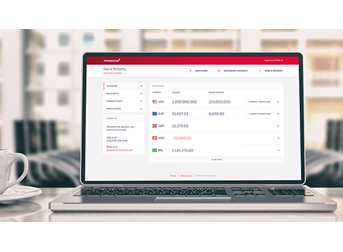Daily Market Pulse

Dollar gains amid risk-off sentiment
7 minute readUSD
The U.S. dollar index, a benchmark used to value the dollar against a basket of major currencies, rallied 0.24% amid global growth concerns dragged by a Chinese slowdown and Jerome Powell’s second-day testimony before congress, where he stuck to a dovish speech. The sour market mood added to the greenback throughout yesterday’s trading session, on top of Continuing Jobless Claims in the U.S. which exceeded expectations posting 3.241 M vs 3.313 M previously anticipated. The constructive job data release comes after Jerome Powell reiterated that further progress, especially in the labor market, needs to be made before policymakers proceed to adjust monetary policy or taper the stimulus program. Moreover, NY Empire State Manufacturing Index posted 43 vs 18 expected, showing a significant pick up in American manufacturing activity, while the Philadelphia Fed manufacturing Survey failed to impress, releasing 21.9 vs 28 previously anticipated. Coming up, U.S. Retail Sales are due to be released for June, which are expected to contract 0.4% on a monthly basis, while Preliminary Michigan Consumer Sentiment Index for July is due at 86.5.
EUR
The common currency stepped back against the dollar, recording 0.2% losses as global growth woes soured the market mood while Fed officials testified before congress in a dovish fashion. Yesterday’s session was quiet in terms of data releases from the euro-zone, and European headlines are focused on the kick-off of the exploratory face for the European Central Bank (ECB) to implement digital Euro. Christine Lagarde, President of the ECB, has flagged the risks that come with digital currencies and the threats they could pose to Financial Stability. Policymakers have reaffirmed their compromise to guarantee that in a digital age, market participants will still continue to have access to the safest form of money, central bank money. The ECB President highlighted the advantages that the digital euro would bring, such as allowing customers to pay electronically and how it would be complementary to the existing monetary system. However, the data pipeline today looks more active, with Consumer Price Index figures expected to be released at 1.9% year over year for June, and Trade Balance figures for May which hopefully will expand the previous surplus of EUR 9.4 billion.
GBP
The British Pound edged 0.23% lower against the greenback amid a sour market mood and a surge in coronavirus cases in the U.K. weighing on the Sterling. Andrew Bailey, Governor of the Bank of England (BoE), referred to the latest upbeat headline inflation figures released at 2.5% year over year, clarifying that policymakers won’t be forced to raise rates given the transitory nature of the current inflationary pressures. Comments from policymakers removed bullish support from the Pound Sterling throughout the session, sponsored by the ILO unemployment rate which posted 4.8% for May, 0.1% higher than what investors previously anticipated. Additionally, the reopening euphoria seems to be shadowed by the latest spike in coronavirus cases due to the outburst of the Delta variant in the U.K. whilst the government sticks to its plan to go ahead with “freedom day” on the 19th of July.
JPY
The Japanese Yen remained steady against the dollar, recording mild gains yesterday ahead of the Bank of Japan (BoJ) monetary policy meeting today. The BoJ announced during the early hours of today's session that the committee has decided to sustain its monetary policy and have interest rates remain unchanged, in line with market expectations. Additionally, the BoJ said that it will start buying green bonds using its foreign reserves as part of a global initiative to promote global investment activities that will help support the war against climate change. These purchases will be based on foreign currency-green bonds issued by governments and other foreign institutions. Governor Kudora said that the bank will actively support financial institutions in edifying and managing their climate-related financial risks, with a view to maintain the stability of the system and the smooth-functioning aspect of its financial intermediation. The news continues to be digested by market participants, with bearish movements for the JPY retracing 0.3% against the USD during the early hours of today.
CAD
The Canadian Dollar suffered some pressure during yesterday's trading session, falling back 0.75% against the dollar amid comments from policymakers in Canada and crude oil prices edging lower, removing support from the Loonie. Tiff Macklem, governor of the Bank of Canada, said during his press conference that the committee is unlikely to raise rates for now as inflationary pressures could be temporary, stressing that for the BoC, “it is not automatic” and policymakers must first assess through data what is needed from the economy. The comments came after the decision from the BoC to leave interest rates unchanged and have their bond purchase program reduced by CAD 1 billion a week whilst adjusting down the growth forecast for 2021. Moreover, the West Texas Intermediate (WTI) edges closer to the psychological support of USD 70 per barrel, stepping back 2.14% due to concerns of a reduced demand for Crude given the potential slowdown in China which weighed on the commodity-linked currency. Later today, Canadian Housing Starts and Wholesale will take the stage followed by Foreign Direct Investment indicators.
MXN
The Mexican Peso fell 0.42% against the greenback as broader dollar demand gained traction and President Andres Manuel Lopez Obrador (AMLO) called out Spanish businesses for taking advantage of Mexico’s public finances. The President lamented that under previous neoliberal governments, Spanish companies like Iberdrola, the biggest energy company in Spain, acted corruptly, receiving contracts that were extremely profitable for them while being disastrous for Mexico’s public finances. However, President AMLO said that Mexico is open to foreign investments and investments from Spain, highlighting that he was referring to legally framed businesses under the protection of public authorities that were in the best interest of the nation. Spain is a main trade partner of Mexico and is the second source of Foreign Direct Investment, with the U.S. heading up the list.
CNY
The Chinese Yuan remained unchanged amid risk-off sentiment among the APAC region and uncertainty ahead of the U.S. advisory warning companies about the risks of doing business in Hong Kong, which has added pressure on the Renminbi. However, recent growth figures from China suggest that weaker consumption would lag the post-pandemic recovery in China with market participants adjusting the growth forecast from 9% to 8.5% for the end of 2021. Moreover, Chinese PPI indicators are showing signs of reheating in July following a cool-off during June which sparked concerns amongst policymakers on the economic outlook. Easing inflationary pressure could allow the People’s Bank of China (PBoC) to focus more on growth as they cut the required reserve ratio (RRR).
BRL
The Brazilian Real stepped back after four consecutive days of gains against the dollar, closing 0.48% lower amid risk-off sentiment and a stall in the Brazilian economic activity. The Brazilian Central Bank (BCB) posted for May a 0.43% reduction in its monthly index of economic activity, a proxy for Gross Domestic Product. Despite the poor figures for May, the year to date performance shows that the Brazilian indicator expanded 6.6%. Brazilian Authorities revised up its GDP growth forecast from 3.5% to 5.3% in its previous macro-fiscal bulletin published in May, and it is likely to be revised in the upcoming release.

